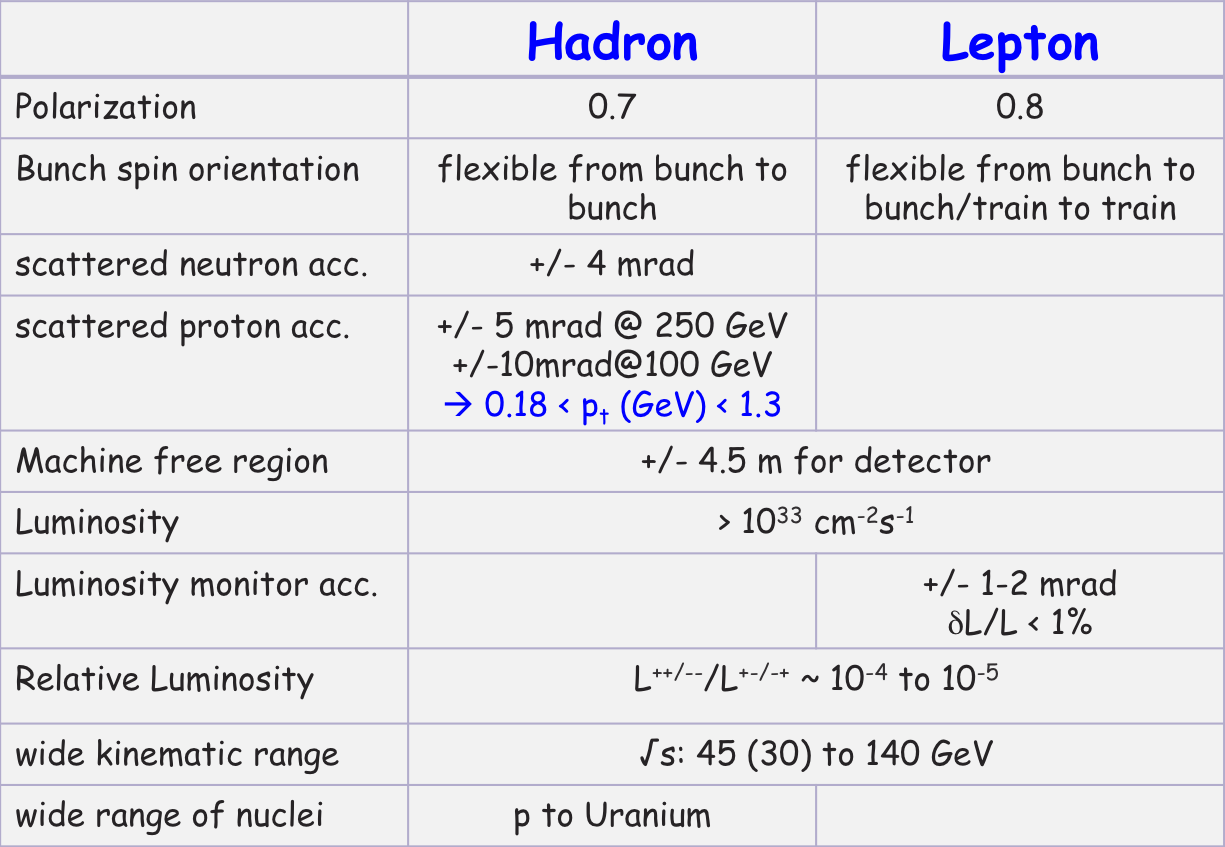e-rhic-ir-l AT lists.bnl.gov
Subject: E-rhic-ir-l mailing list
List archive
- From: Aschenauer Elke-Caroline <elke AT bnl.gov>
- To: "Palmer, Robert" <palmer AT bnl.gov>
- Cc: Alexander Kiselev <kisselev AT mail.desy.de>, "Berg, J Scott" <jsberg AT bnl.gov>, "E-rhic-ir-l AT lists.bnl.gov" <E-rhic-ir-l AT lists.bnl.gov>
- Subject: Re: [E-rhic-ir-l] Latest version of IR dry-run
- Date: Wed, 15 Mar 2017 09:57:41 -0400
Dear Bob,
a couple of thoughts to your talk. I hope they are a bit helpful
cheers elke
I don't know who is on the committee for this review, but they might not be familiar with EIC therefore I suggest you need one or two slides
which state the challenges for this IR design.
I have attached a table which has them summarized.
also you can find a lot of info in https://www.dropbox.com/s/1mn6x6t9phun9nf/eRHIC.Requirements.pptx?dl=0
and for the protons and neutrons in here https://www.dropbox.com/s/9l3aggo0bbxti9p/eRHIC.Requirements.pptx?dl=0
You use abbreviations like HA, HI I would at least spell them out the first time
slide 7: I would give the equation for the process measuring luminosity ep --> e+p+gamma
and that the gamma is converted to e+e- to reduce the SR contribution and get the precision for the luminosity measurement needed.
maybe it would be also good to point out why we need the electron tagger
--> detect scattered leptons with very small Q2, which means very small scattering angle
slide 8: are really all plots fro high acceptance
slide 9: needs some labeling what the different rays represent
slide 13: this distribution of protons is valid for all diffractive processes DVCS is just a poster child for this processes
slide 14&15: you bank on what you call spectrometer, please realize nobody has developed anything for this if this is really needed this needs to be developed
and shown to work the way we need
also the RP after the cavity with the high dispersion setting are not really the best right now, one problem which is currently worked on it seems it will be very hard to reconstruct p_t
unambiguously, but we discussed already this needs more work
slide 18: I must admit I don't understand
slide 20: right now there are no RP with 50ps timing
as we also discussed kinematic fitting cannot be something we rely on at this stage of the project,
there are other diffractive processes which also need the proton detection for which it might not work.

On Mar 14, 2017, at 17:30, Palmer, Robert <palmer AT bnl.gov> wrote:
Latest version of IR dry-run tomorrow
Ps I do not know what I was thinking in my last version. The use of some mix of HL and HA parameters indeed seems the right thing to do.
The current very large y divergences in both HA and HL are probably the most worrying things to discuss. We need more study of the Low Divergence (LD), and very Low Divergence (VLD) cases that I had started looking at. I am not sure how much that should be discussed in the Review. I am also not sure how much mention I should make of the VHL (without cooling) case.
Bob
Ps I know this will have to be put into Power Point, unless we could persuade Scott to make a Tex version that mimics PP. Do we have the PP profile that we should be using?
<1703-IR-talk-v3.pdf>
( `,_' )+=-+=-+=-+=-+=-+=-+=-+=-+=-+=-+=-+=-+=-+=-+=-+=-+=-+=
) `\ -
/ '. | +
| `, Elke-Caroline Aschenauer =
\,_ `-/ -
,&&&&&V Brookhaven National Lab +
,&&&&&&&&: Physics Dept., 25 Corona Road =
,&&&&&&&&&&; Bldg. 510 /2-195 Rocky Point, NY, -
| |&&&&&&&;\ 20 Pennsylvania Avenue 11778 +
| | :_) _ Upton, NY 11973 =
| | ;--' | Tel.: 001-631-344-4769 Tel.: 001-631-569-4290 -
'--' `-.--. | Cell: 001-757-256-5224 +
\_ | |---' =
`-._\__/ Mail: elke AT bnl.gov elke.caroline AT me.com -
=-+=-+=-+=-+=-+=-+=-+=-+=-+=-+=-+=-+=-+=-+=-+=-+=-+=-+=-+=-+=-+=
-
Re: [E-rhic-ir-l] Latest version of IR dry-run,
Palmer, Robert, 03/14/2017
- Re: [E-rhic-ir-l] Latest version of IR dry-run, Aschenauer Elke-Caroline, 03/15/2017
Archive powered by MHonArc 2.6.24.